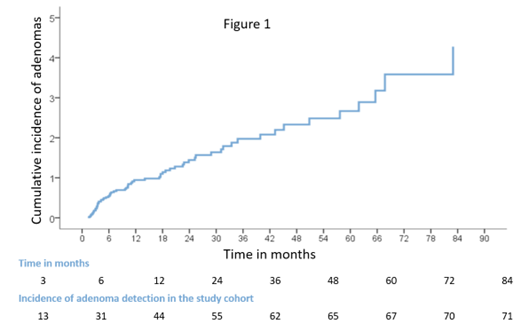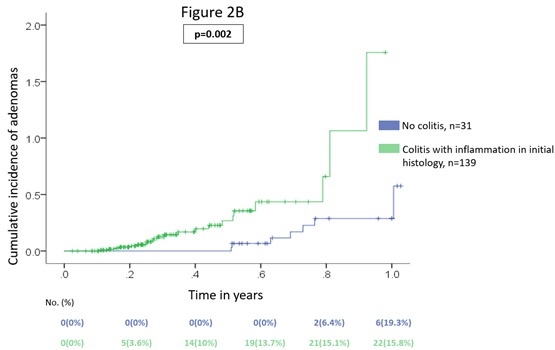Oral Paper Presentation
Annual Scientific Meeting
Session: Plenary Session 3B: Luminal GI / Endoscopy / Pancreas
53 - Early Colon Adenoma Development Following Immune Checkpoint Inhibitor Colitis: Implications for Prompt Surveillance Colonoscopy
Tuesday, October 28, 2025
3:25 PM - 3:35 PM PDT
Location: North Ballroom 120BC

Tanvi Gupta, MD
University of Texas Health Science Center
Houston, TX
Presenting Author(s)
Tanvi Gupta, MD1, Carolina Cruz, MD2, Alice Saji, DNP, MSN, FNP-C2, Sean Ngo, BS3, Rohan Ahuja, MD4, Andrew Lee, BS2, Sidra Naz, MD, MPH2, Yinghong Wang, MD, PhD, MS2
1University of Texas Health Science Center, Houston, TX; 2University of Texas MD Anderson Cancer Center, Houston, TX; 3McGovern Medical School at UTHealth, Houston, TX; 4University of Texas at Houston, Houston, TX
Introduction: Immune checkpoint inhibitors (ICIs) have transformed cancer therapy but are associated with gastrointestinal toxicities, including ICI-mediated diarrhea and colitis (IMDC). While prolonged IMDC has been linked to improved cancer outcomes, its long-term impact on colon polyps remains underexplored. A preliminary study on a small sample size suggested a higher incidence of adenomas in patients with IMDC, warranting a larger investigation to refine strategies on surveillance colonoscopy.
Methods: This retrospective study, conducted at a tertiary cancer center from 2010 to 2025, included adult patients who developed IMDC confirmed by colonoscopy within 90 days of onset, and underwent a follow-up colonoscopy at any time point (n=248). A historical control group included ICI-treated patients without IMDC, who underwent two colonoscopies within 1 year without histological abnormalities.
Results: The IMDC cohort was 57.9% male and 90.3% white, with a median age of 63.1 years. Most received either PD-1/L1 inhibitors (43.7%) or combination therapy including CTLA-4 inhibitors (42.5%), and the predominant cancer types were melanoma and genitourinary malignancies. 71 patients developed adenomas on follow-up colonoscopies. Notably, over 50% of these adenomas developed rapidly within 7.5 months of IMDC onset, after which the rate declined over the subsequent six years (figure 1). Among the 210 patients who underwent follow-up colonoscopy within one year of IMDC onset, the adenoma incidence was 15.9% in those without a prior history of polyps, compared to 33.9% in those with baseline polyps (p=0.004). In patients with baseline histological inflammation, those with baseline adenomas were significantly more likely to develop new adenomas on follow-up (32.6% vs. 15.8%, p=0.014). Within this subset, patients without a prior history of polyps (n=139) were compared to the control group without IMDC (n=31), revealing a significantly higher cumulative incidence of adenoma development in the IMDC group (p=0.002, figure 2b). Colitis was significantly associated with adenoma development in Cox regression analysis (HR=3.6, p=0.004), indicating a time-dependent risk.
Discussion: These findings provided evidence that the presence of baseline adenomas and IMDC increased the risk of subsequent adenoma formation. Surveillance colonoscopy within 1 year of IMDC diagnosis is warranted to ensure early detection of adenomas and mitigate the risk of developing subsequent colon cancer.

Figure: Figure 1: Among the IMDC cohort, 71 patients developed adenoma polyps on follow-up colonoscopies. Notably, over 50% of these adenomas developed rapidly within 7.5 months of IMDC onset, after which the rate of adenoma development declined over the subsequent six years.

Figure: Figure 2b: Among patients with IMDC, those that had histological inflammation and no polyps on baseline colonoscopy had a significantly higher cumulative incidence of adenoma development compared to the historical control group who received ICI therapy but did not develop IMDC.
Disclosures:
Tanvi Gupta indicated no relevant financial relationships.
Carolina Cruz indicated no relevant financial relationships.
Alice Saji indicated no relevant financial relationships.
Sean Ngo indicated no relevant financial relationships.
Rohan Ahuja indicated no relevant financial relationships.
Andrew Lee indicated no relevant financial relationships.
Sidra Naz indicated no relevant financial relationships.
Yinghong Wang indicated no relevant financial relationships.
Tanvi Gupta, MD1, Carolina Cruz, MD2, Alice Saji, DNP, MSN, FNP-C2, Sean Ngo, BS3, Rohan Ahuja, MD4, Andrew Lee, BS2, Sidra Naz, MD, MPH2, Yinghong Wang, MD, PhD, MS2, 53, Early Colon Adenoma Development Following Immune Checkpoint Inhibitor Colitis: Implications for Prompt Surveillance Colonoscopy, ACG 2025 Annual Scientific Meeting Abstracts. Phoenix, AZ: American College of Gastroenterology.
1University of Texas Health Science Center, Houston, TX; 2University of Texas MD Anderson Cancer Center, Houston, TX; 3McGovern Medical School at UTHealth, Houston, TX; 4University of Texas at Houston, Houston, TX
Introduction: Immune checkpoint inhibitors (ICIs) have transformed cancer therapy but are associated with gastrointestinal toxicities, including ICI-mediated diarrhea and colitis (IMDC). While prolonged IMDC has been linked to improved cancer outcomes, its long-term impact on colon polyps remains underexplored. A preliminary study on a small sample size suggested a higher incidence of adenomas in patients with IMDC, warranting a larger investigation to refine strategies on surveillance colonoscopy.
Methods: This retrospective study, conducted at a tertiary cancer center from 2010 to 2025, included adult patients who developed IMDC confirmed by colonoscopy within 90 days of onset, and underwent a follow-up colonoscopy at any time point (n=248). A historical control group included ICI-treated patients without IMDC, who underwent two colonoscopies within 1 year without histological abnormalities.
Results: The IMDC cohort was 57.9% male and 90.3% white, with a median age of 63.1 years. Most received either PD-1/L1 inhibitors (43.7%) or combination therapy including CTLA-4 inhibitors (42.5%), and the predominant cancer types were melanoma and genitourinary malignancies. 71 patients developed adenomas on follow-up colonoscopies. Notably, over 50% of these adenomas developed rapidly within 7.5 months of IMDC onset, after which the rate declined over the subsequent six years (figure 1). Among the 210 patients who underwent follow-up colonoscopy within one year of IMDC onset, the adenoma incidence was 15.9% in those without a prior history of polyps, compared to 33.9% in those with baseline polyps (p=0.004). In patients with baseline histological inflammation, those with baseline adenomas were significantly more likely to develop new adenomas on follow-up (32.6% vs. 15.8%, p=0.014). Within this subset, patients without a prior history of polyps (n=139) were compared to the control group without IMDC (n=31), revealing a significantly higher cumulative incidence of adenoma development in the IMDC group (p=0.002, figure 2b). Colitis was significantly associated with adenoma development in Cox regression analysis (HR=3.6, p=0.004), indicating a time-dependent risk.
Discussion: These findings provided evidence that the presence of baseline adenomas and IMDC increased the risk of subsequent adenoma formation. Surveillance colonoscopy within 1 year of IMDC diagnosis is warranted to ensure early detection of adenomas and mitigate the risk of developing subsequent colon cancer.

Figure: Figure 1: Among the IMDC cohort, 71 patients developed adenoma polyps on follow-up colonoscopies. Notably, over 50% of these adenomas developed rapidly within 7.5 months of IMDC onset, after which the rate of adenoma development declined over the subsequent six years.

Figure: Figure 2b: Among patients with IMDC, those that had histological inflammation and no polyps on baseline colonoscopy had a significantly higher cumulative incidence of adenoma development compared to the historical control group who received ICI therapy but did not develop IMDC.
Disclosures:
Tanvi Gupta indicated no relevant financial relationships.
Carolina Cruz indicated no relevant financial relationships.
Alice Saji indicated no relevant financial relationships.
Sean Ngo indicated no relevant financial relationships.
Rohan Ahuja indicated no relevant financial relationships.
Andrew Lee indicated no relevant financial relationships.
Sidra Naz indicated no relevant financial relationships.
Yinghong Wang indicated no relevant financial relationships.
Tanvi Gupta, MD1, Carolina Cruz, MD2, Alice Saji, DNP, MSN, FNP-C2, Sean Ngo, BS3, Rohan Ahuja, MD4, Andrew Lee, BS2, Sidra Naz, MD, MPH2, Yinghong Wang, MD, PhD, MS2, 53, Early Colon Adenoma Development Following Immune Checkpoint Inhibitor Colitis: Implications for Prompt Surveillance Colonoscopy, ACG 2025 Annual Scientific Meeting Abstracts. Phoenix, AZ: American College of Gastroenterology.


